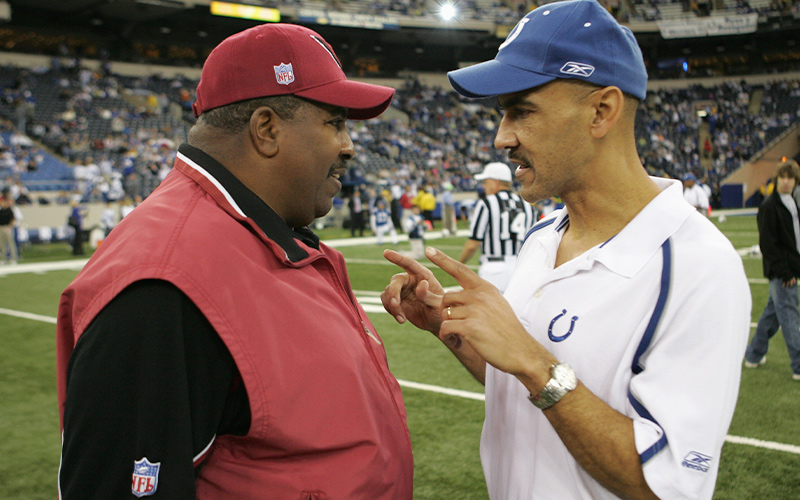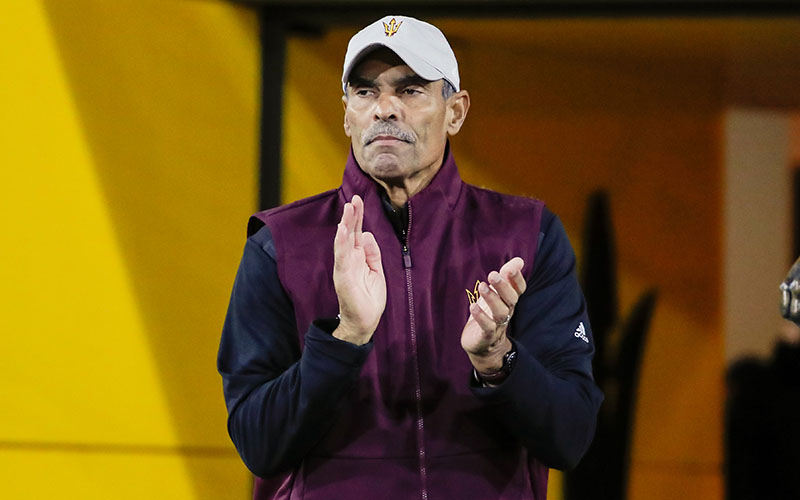
In 2002, criminal defense attorney Johnnie Cochran and civil rights attorney Cyrus Mehri threatened to sue the NFL after Black head coaches Dennis Green (left) and Tony Dungy were fired by the Minnesota Vikings and Tampa Buccaneers, respectively. Green later coached the Arizona Cardinals from 2004-2006. (Photo by Andy Lyons/Getty Images)
PHOENIX – The failure of the Rooney Rule to bring more Black head coaches to the NFL has prompted some experts to suggest it might be time to turn to the courts in order to push the league into hiring more minority candidates.
Introduced in 2003 to ensure that minority coaches are given the opportunity to be interviewed for head coaching positions, the Rooney Rule originally required teams to interview at least one minority candidate before hiring a head coach. It now requires teams to interview two minority candidates for head coaching jobs.
Named for Dan Rooney, late owner of the Pittsburgh Steelers who served as chairman of the NFL’s diversity committee, the Rooney Rule was expanded in 2009 to include candidates for general managers and equivalent front-office positions.
But while the rule has given minority candidates a chance to interview for jobs, it hasn’t necessarily led to equity in hiring.
Notably, Kansas City Chiefs offensive coordinator Eric Bieniemy, who is Black, interviewed for six vacant positions during this offseason and wasn’t hired for any of them. He had interviewed for seven other head coaching jobs over the previous two hiring cycles and was not hired for any of those, either, despite coordinating the NFL’s leading offense.
During a recent panel discussion organized by Global Sport Matters, several experts raised the possibility of litigation against the NFL and its team owners for the lack of minority representation in head coaching jobs.
“We’re at the point of contemplating it. I don’t know if we’re at the point of filing it,” said Kenneth Shropshire, CEO of the Global Sport Institute and Adidas Distinguished Professor of Global Sport at Arizona State University.
First, however, there needs to be a coach or executive who believes they haven’t been hired because of their race and is willing to put their name on a suit.
“If there’s going to be a legal action brought, then you have to have a plaintiff. Which means you’ve got to have somebody who’s been discriminated against, the coach, bring the action and be the spearhead,” said Jeremi Duru, Professor of Law at American University Washington College of Law.
The NFL has a long history of passing over minority candidates for head coaching jobs, despite a large percentage of Black players. And that hasn’t changed much, even with the Rooney Rule.
The Institute for Diversity and Ethics in Sport’s 2019 racial and gender report card found that 58.9% of the NFL’s players are Black, but there were only four African American head coaches that year. In its most recent report card, the Institute gave the NFL a D-plus for diversity of its head coaches and an F for hiring minority general managers – who typically are the people who hire head coaches.
Additionally, a Global Sport Matters study revealed that the percentage of minority offensive and defensive coordinators, jobs considered the last stepping stone to a head coaching position, has dropped since 2002-03. In the 2002-03 season, 43% of offensive coordinators were African American; today it is only 8%. On the defensive side, African American coordinators have dropped from 37% to 29%.
And it is not the first time that legal action has been contemplated to force the NFL into action. In 2002, criminal defense attorney Johnnie Cochran and civil rights attorney Cyrus Mehri threatened to sue the league after Black NFL head coaches Tony Dungy and Dennis Green were fired. They proposed that teams that do not interview a minority candidate for head coach positions should lose a first-round draft pick and the teams should lose a third round pick for failing to interview a minority for assistant coaching positions. They also suggested that teams should be awarded an additional pick for hiring minorities.
While their proposal wasn’t adopted, the NFL collaborated with Cochran and Mehri through Rooney, and the NFL adopted the Rooney Rule the following year.
Since then, there hasn’t been the threat of legal action.
However, since the Rooney Rule was adopted, the highest number of minority coaches in one season was eight in 2011. Just two years later, the number was back down to four.
“Really what’s happening here, as far as I can tell, is that there are people to choose from, but they’re not being chosen. And so the question is, how do we change that?” said Melissa S. Woods, Partner at Cohen, Weiss and Simon, LLP “We need to embarrass people if we need to. Hit them in their pocket, get a social media campaign going, get them to courts and make them spend a lot of money to get rid of us.
“Even if we don’t win there.”
In an effort to strengthen the rules, a resolution modeled after the Cochran-Mehri proposal passed last year expanding the Rooney Rule to reward teams that develop minority coaches and player-personnel executives with compensatory draft picks.
In November, 2020 Resolution JC-2A passed and gives teams a third-round draft pick in consecutive drafts if another NFL team hires one of their minority candidates as head coach, general manager or an executive position that is the equivalent of a GM.
The new rule quickly came into play when the Los Angeles Rams were awarded third round picks in 2021 and 2022 after the Detroit Lions hired Brad Holmes as general manager and executive vice president. Holmes, who is Black, had served as the Rams’ director of college scouting.
Before the Rooney Rule, there had only been eight minority head coaches in the history of the NFL – Green, Dungy, Fritz Pollard, Tom Flores, Wayne Fontes, Art Shell, Ray Rhodes and Herm Edwards, now the coach at Arizona State. Pollard broke the color line in 1921 as player-coach of the Akron Pros in the early years of the NFL.
It took 58 years before the Raiders hired Tom Flores as the next minority NFL head coach in 1979.
There were three minority head coaches in the NFL when the Rooney Rule was adopted. In the 18 years since, there have been just 16 minority candidates who have landed a head coaching job in the league. Ten NFL teams have never had a minority head coach.
Today, there are five NFL teams –the Pittsburgh Steelers, Miami Dolphins, New York Jets, Washington Football Team and Houston Texans – that have a minority head coach. Two, Mike Tomlin of the Steelers and David Culley of the Texans, are Black. Two, Brian Flores of the Dolphins and Ron Rivera in Washington, are Hispanic. And Jets coach Robert Saleh is Arab American and the league’s first Muslim head coach.
While litigation is an option, the threat of lost revenue seems to be a more powerful influence on the NFL than threats of legal action.
When FedEx threatened to pull its name off of FedExField, Washington’s stadium, if the franchise refused to drop “Redskins” as the team mascot, the club dropped the nickname and became the Washington Football Team.
“For 20 years, litigation was brought against the Washington Football Team to change their name and for 20 years it failed. Then we got to the sponsor pressure, and we got where we needed to be,” Duru said.
There are more obstacles, and the biggest remains the lack of a plaintiff.
But recent history suggests that the threat of legal action can get the NFL’s attention. NFL players Colin Kaepernick and Eric Reid filed a grievance in 2017 that argued NFL owners had colluded to blacklist Kapernick because he kneeled during the playing of the national anthem in his effort to bring attention to police brutality and racial inequity.
According to USA Today, Kaepernick and Reid settled with the league in 2019 and received a little less than $10 million. However, Kaepernick still has not played in the NFL again.

